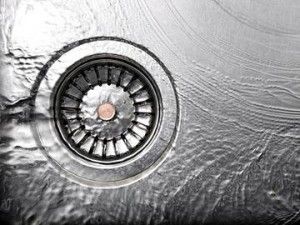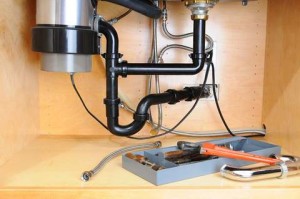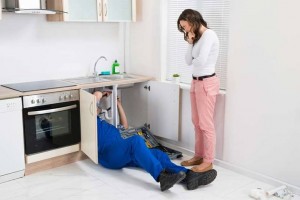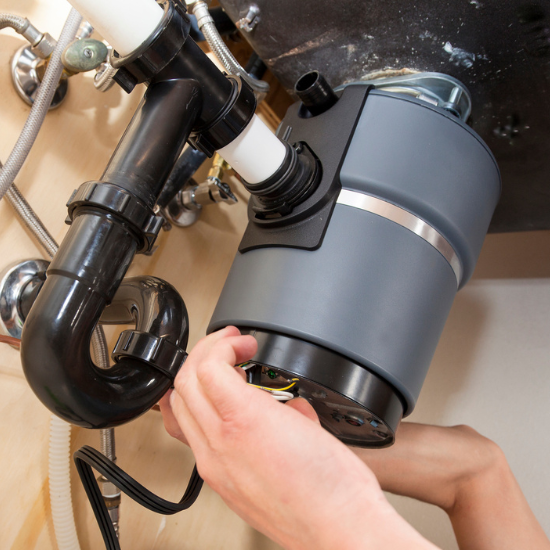
In a world where appliances make life easier, garbage disposals have become a time-saving convenience. Garbage disposals work like a food processor with sharp blades breaking food down into small pieces so it can pass through the small holes found at the bottom of the unit. But like other appliances, your disposal is often overlooked and is not maintained properly which can lead to malfunctions like leaks.
A leaking garbage disposal can be a stubborn repair because leaks can occur in several parts of the system which makes it difficult to diagnose the origin. To find where a leak is coming from, you will have to conduct a thorough search of all the disposal’s parts and bolts.
Common Garbage Disposal Leaks
Sink Flange Leak:
The sink flange is the uppermost part of the garbage disposal. It is connected to the sink drain and may potentially leak due to a number of reasons. One common reason behind a leaking sink flange is that the mounting bolts are not tightly secured.
Plumber’s Putty Fails:
When putty fails, leakage is likely to occur. In order to replace the putty, you will first need to loosen the retaining bolts. After loosening the bolts, you must create a gap and force place new putty in between the pipe and the flange. After doing so, you want to re-tighten the bolts that hold the putty in place.
Dishwasher Connection Leak:
Some garbage disposals are connected to the drainpipe of the dishwasher. This connection is designed to help get rid of leftovers from your dishes as they go through the washing cycle. Leaks can occur at the hose clamp, where the disposal unit connects with the dishwasher. Leaks can also happen if the hose clamp is not well secured. If the hose clamp is the cause of the leakage, the clamp needs to be tightened or the hose must be replaced.
Discharge Tube Leak:
On the bottom of the garbage disposal unit, a discharge tube is connected to the sink drain. The discharge tube is connected through the flange and seals, which can loosen over time due to normal wear and tear.

Crack in the Body of the Disposal Unit:
As the garbage disposal gets older, its interior shell becomes susceptible to cracking. If the shell is cracked, water will emerge from the seams. If the inner disposal of the unit is cracked, you will need to replace the entire disposal unit.
Knocked Loose Leak:
The bulk of garbage disposal systems, that include pipe connections, are located under the kitchen sink. The rest of the area under the sink is used for storing different items.
It is common for a person to bump into garbage disposal pipes while trying to reach for something else in proximity. As a result, seals can be pressed into an awkward position, pipes can be moved, and retaining bolts can be loosened. So it is important to conduct routine checks to make sure nothing has been knocked out of place.
The Do’s & Don’ts of Maintaining Your Garbage Disposal:
- Do keep your disposal clean. Pouring soap and letting cold water run for a few seconds will help keep your disposal clean.
- Do run your garbage disposal frequently. This will help to prevent corrosion and rust.
- Run your disposal with cold water. Cold water will prevent grease and oil from becoming solid, therefore preventing clogs in your drain.
- Do not use hot water to grind food waste, hot water allows grease to accumulate, causing drains to clog.
- Do not turn off motors before grinding is fully completed. You should let the water continue running for 15 more seconds after grinding is completed.
- Do not use bleach or drain cleaners in the garbage disposal. They can damage the seals and blades.
- Do not put non-biodegradable material down the drain such as
- Glass, plastic, metal, and paper
- Combustible materials
- Cigarette butts
- Grease, fat, or oil

If you have a leak in your garbage disposal, it’s important to take immediate action. Contact the skilled Indianapolis plumbers at L.E. Isley & Sons. We have over four decades of experience with four generations of our family working in the industry. As a family owned and operated company, we treat our customers like our own. You can rest assured that your garbage disposal will be fixed quickly and properly – guranteed!
Need your garbage disposal fixed? Contact our skilled Indianapolis plumbers today by calling (317) 420-4006.

